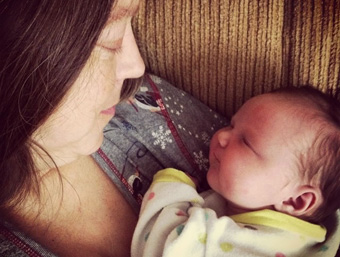 It is possible. You can get pregnant after endometrial ablation and tubal ligation.
It is possible. You can get pregnant after endometrial ablation and tubal ligation.
Before you get started there are several things you should be aware of before you try to conceive after an endometrial ablation procedure.
First, if you want to become pregnant after endometrial ablation, you should be aware most doctors will recommend that you not become pregnant after an ablation procedure. Why?
The ablation damages the lining of the uterus, makes pregnancy less likely, and increases the risk of each pregnancy after ablation.
Second, if you want to become pregnant after endometrial ablation, you should be aware there are women who have become pregnant after an ablation….some accidentally and others intentionally.
Many of these women have had uncomplicated pregnancies and healthy babies. Some have multiple pregnancy miscarriages, stillbirth, and more difficult deliveries.
Third, if you want to become pregnant after endometrial ablation you need to carefully consider the risk an endometrial ablation pregnancy poses to your health. If you have a complicated delivery you could end up with a D and C, C-section, blood transfusion… or even worse… a hysterectomy.
You will need to decide between IVF or tubal ligation reversal surgery. More importantly, you will need to find a supportive doctor who will help you navigate the risks of getting pregnant after an endometrial ablation pregnancy.
So if you have asked yourself can you get pregnant after endometrial ablation and tubal ligation…the answer is yes BUT there are some very important items you need to educate yourself about before trying to have another baby.
What is an endometrial ablation?
A few people reading this will wonder, “What the heck is an endometrial ablation?”
Usually, if you had an ablation of your uterine lining… you will know what it is all about.
If you dont know anything about an ablation then you probably never had the procedure.
Endometrial ablation is a treatment for heavy periods.
The only person who should get an endometrial ablation is a woman who is having periods so heavy they are causing her to be anemic (low iron from excessive blood loss).
Many women will commonly develop heavier periods as they become older. Often the iron lost during excessive menstruation is enough to make these women anemic. They are unable to keep up with iron loss through diet or iron supplements.
An endometrial ablation is a surgical procedure to decrease menstrual flow in women who are anemic because of excessive bleeding during their periods. Endometrial ablation is only recommended for these women when they don’t want to become pregnant again.
More information: What Exactly Is Endometrial Ablation?
Women with heavy periods have several options: birth control pills, hysterectomy, or endometrial ablation.
Many women will choose to have an endometrial ablation procedure to avoid a major surgery like hysterectomy.

Thermachoice ballon ablation
An endometrial ablation procedure is often simple, quick, and can often be done in a doctor’s office. The doctor burns the uterine lining to remove it….if you remove the uterine lining then you either stop having periods or your period flow decreases and you dont lose as much blood/iron every month.
There are many different types of ablation: Novasure, Thermachoice, cryoablation, hydrothermal, rollerball coagulation, and a few others.
The type of ablation is not as important as simply realizing that all ablation procedures are intended to delivery an energy source to the uterine lining. The purpose is to damage the lining and lessen the amount of bleeding during a menstrual cycle. If you lessen the bleeding then you dont lose as much iron. Your body then has a chance to catch up, absorb more iron, create more red blood cells, and correct your anemia.
During the endometrial ablation procedure, the doctor inserts one of the devices mentioned above inside the uterus. The ablation device delivers energy to the inside of the uterine cavity. The energy damages the uterine lining (endometrial tissue) and also the blood vessels that support the uterine lining. This energy damages most of the uterine lining. When the lining is removed then a woman’s periods either decrease or stop all together.
Often the doctor will recommend permanent birth control like tubal ligation or vasectomy to really make sure pregnancy does not happen after an endometrial ablation procedure.
Unfortunately, some women regret their endometrial ablation and want to become pregnant again. This is problematic because you need a healthy lining to accept and support a fertilized egg. You need a healthy lining and good blood circulation in the uterine muscle to help grow a healthy baby to full term.
Getting pregnant after endometrial ablation
Dr. Charles Monteith is a fertility surgeon who exclusively provides tubal ligation reversal and vasectomy reversal surgery. He is the Medical Director of A Personal Choice Tubal Reversal Center in Raleigh North Carolina.
Dr. Monteith specializes in tubal ligation reversal in women who regret their tubal ligation and want to become pregnant again.
As a result of his specialization, many women turn to him for treatment when they have difficult situations. Although Dr. Monteith does not offer IVF, he does see women who want to become pregnant after having a tubal ligation and an endometrial ablation.
The following is a pregnancy testimonial sent to him by one of his patients who became pregnant after reversing her tubal ligation after she had an endometrial ablation procedure.
Dr. Monteith
I had my tubes tied in 2012 after the birth of my youngest daughter, then an endometrial ablation in 2014.
My fiancé and me have no children together. My three are from my first marriage. After three years of saving, research planning, and preparing we had our tubal reversal 8 months ago, on February 11th.
I am currently 30 weeks pregnant (we successfully got pregnant in March). Our son is due December 12th, and this is my healthiest pregnancy yet.
My last ultrasound was 28 weeks 6 days, and he was 2lbs 12oz.
We are so thankful to Dr. Monteith. There were so many risk factors because of my medical history, and so many negative conversations, but Dr. Monteith gave us the opportunity to make our own educated decision about getting the reversal and we could not be happier.
He and his staff truly are the best.
Patient age: 29
Tubal ligation type: Ligation resection (tied and cut)
Patient hometown: Greencastle, Pennsylvania
What are your choices for getting pregnant after endometrial ablation procedure?
If you regret your endometrial ablation procedure after you have had your tubes tied then you have four choices:
1) Adoption
2) In-vitro fertilization (IVF) your eggs/your uterus
3) In-vitro fertilization with a gestational surrogate
4) Tubal reversal surgery
Most experts recommend you not become pregnant after an endometrial ablation procedure because each pregnancy will be at much higher risk of a serious complication.
Adoption is straightforward and easy to understand. Although many people express interest in adoption, most couples wont actually pursue adoption as a means to have another child. Most couples want a child genetically similar to themselves.
Adoption is not always easy, may take several months to years, and can be just as expensive and sometimes even more expensive than infertility treatments. Not even adoption is guaranteed…sometimes the process breaks down near the end and the adoption may never occur. Adoption is always a noble idea and should be strongly considered by women who want another child after having an endometrial ablation.
IVF with own eggs/own uterus.Here is where the problems begin. Most IVF doctors will not want to work with you if you have had an ablation procedure. Why?
People pick IVF doctors based on their success. IVF doctors only want to work with patients who can give them the best chance of success. IVF is less likely to work when you have had an endometrial ablation because the uterine lining is damaged and the eggs are less likely to implant. Many IVF doctors will strongly recommend you have a gestational surrogate. Also you should be aware a single cycle of IVF costs around $14,000.
IVF gestational surrogate. Many experts recommend you have IVF with a gestational surrogate. Essentially this means you can use your own eggs fertilized by your partner’s sperm….but you have to have a gestational surrogate (another woman with a healthy uterus who has not had an endometrial ablation) to carry your pregnancy.
Although IVF with a gestational surrogate is recommended, many women with endometrial ablation will find this an expensive way to go.
- A cycle of IVF averages $14,000.
- A gestational surrogate will cost anywhere from $30,000 to $100,000 to carry the pregnancy for 9 months.
- You are also responsible for legal bills and the surrogate’s health care.
Tubal reversal. Some women will consider tubal reversal surgery. In the appropriately selected candidate tubal reversal can be an option to become pregnant naturally. Tubal reversal allows you the chance to become pregnant every month…and you can become pregnant more than once. Each month you have a chance to become pregnant and each month the chances add up.
More information: Cost of tubal reversal
Tubal reversal can be a more affordable alternative to IVF. Each month you have a chance to get pregnant and you dont need the assistance or treatment of a medical professional.
Getting pregnant after endometrial ablation: Tubal reversal or IVF?
More information: Pregnancy Testimonials After Endometrial Ablation and Tubal Reversal
You will be greatly mistaken if you believe IVF is better. IVF is only better than tubal reversal when you use a gestational surrogate.
When you see the cost of IVF or when an IVF doctor they refuses to see you because of your ablation…only then will you understand how tubal reversal can be a good alternative to IVF.
Tubal reversal and ablation: Advice on getting pregnant?
 In general pregnancy is not recommended after endometrial ablation because of the higher risk of pregnancy miscarriage, stillbirth, fetal growth problems, and higher risk deliveries.
In general pregnancy is not recommended after endometrial ablation because of the higher risk of pregnancy miscarriage, stillbirth, fetal growth problems, and higher risk deliveries.
Dr. Monteith does offer specially selected candidates with endometrial ablation tubal ligation reversal surgery because pregnancy is possible.
Pregnancy after ablation can be safe and successful in appropriately selected candidates.
Women considering reversal after a having endometrial ablation should educate themselves about the risks of becoming pregnant after endometrial ablation.
Endometrial ablation and pregnancy: Must read articles
Dr. Monteith has written five informative blog articles to better educate those who are considering pregnancy after endometrial ablation procedure.
We encourage you to click on each link below, read the information, and then use the back link to get back to this page.
After reading the information contained in these links, we will tell you how you can determine if you are a candidate for tubal reversal surgery after having had an endometrial ablation procedure and what are the next steps you will need to take.
- Pregnancy After Endometrial Ablation And Tubal Reversal
- Effects on Endometrial Ablation on Pregnancy
- Tubal Reversal, Endometrial Ablation, Pregnancy: Concerns
- Pregnancy After Endometrial Ablation: Study Review
- Endometrial Ablation and Tubal Ligation Reversal: Advice
Can you have tubal reversal after ablation?
We have two requirements for you to be considered a candidate for ligation reversal surgery after endometrial ablation:
- You must have regular periods
- You must complete an office/phone consultation with Dr Monteith before you can schedule
Regular periods. To be considered a candidate for tubal reversal after ablation we require you be having regular (every month) periods of at least three (3) days duration.
Most endometrial ablations are not 100% successful at totally stopping your menstrual cycle. In fact, most women who have an ablation (4 out of 5) will continue to have regular periods. Only 1 out of 5 women will never have a period the rest of her life. So for many women it can be very normal to have regular periods after an endometrial ablation procedure.
Most women will report their periods after ablation have become lighter but many will continue to have regular predictable periods after ablation because ablation is not 100% effective at permanently removing the entire uterine lining.
 If you are not having regular periods or these periods are less then three days duration then we cannot consider you an acceptable candidate for tubal reversal. There are no treatments to increase the health of your lining if your lining has been damaged by an ablation procedure.
If you are not having regular periods or these periods are less then three days duration then we cannot consider you an acceptable candidate for tubal reversal. There are no treatments to increase the health of your lining if your lining has been damaged by an ablation procedure.- If you are having regular periods after ablation and these periods are lasting for 3 days or longer then we will consider you a candidate for tubal reversal surgery.
Office/phone consultation. We require all patients who have reversal at our facility after an ablation to have a mandatory phone or office consultation with Dr. Monteith before they can schedule.
The purpose of this consultation is to fully inform patients about the potential risks of pregnancy after an ablation procedure.
For more information on how to schedule a phone/office consultation: Endometrial ablation phone/office consultation
If you have any question then please give us a call and we can better answer your questions for you. You can reach our office at (919) 977-5050









